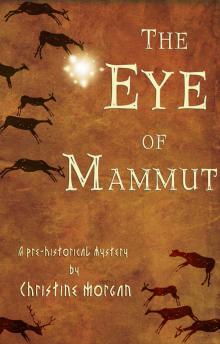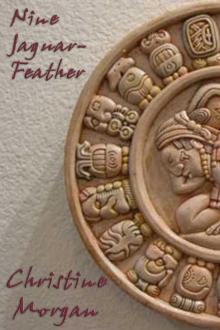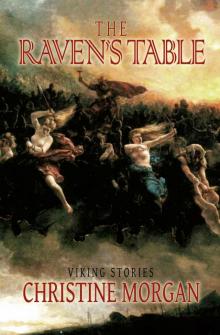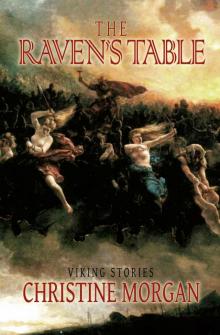- Home
- Christine Morgan
The Raven's Table Page 10
The Raven's Table Read online
Page 10
He sings livelier songs, cheerful ones to amuse and entertain the crowds. He sings of Jotunheim’s master builder and how Loki took horse-shape to trick the giant into losing a bet. He sings of dwarf-gold and Saxon silver, of battles and kings and bold deeds.
And when, at last, he and the others return to their ship, she follows.
She wades into the surf, dives beneath the waves, and follows.
***
They sailed to an inlet where Utwald, whose ship the Wind-Chaser was, had a brother who had a farmstead and hall. There, Utwald assured them, they would have welcome and hospitality for a few days.
Utwald’s brother, Utbranni, made good on that promise. His was not a grand hall, but comfortable. His farm thrived. His folk raised pigs and tended fruit trees. The men feasted on boiled pork. They drank their fill of apple-wine.
Then, one evening when he’d had perhaps slightly more than his fill of apple-wine, Farald stepped out of the smoky hall for a breath of fresher air. The night was cool and damp, fog-wreathed.
He felt a prickling on the nape of his neck. He caught a glimpse of furtive movement from the corner of his eye and turned.
A girl stood half-hidden behind a log-pile. Dark eyes stared at him through tangled dark hair.
Farald opened his mouth to speak, but at that moment two of his ship-mates staggered from the hall. They bumped into him, bumped into each other, laughed heartily, and slung companionable arms around his neck.
“Sing with us, oar-brother!” Vafri cried.
Gullaug blinked in the direction of the girl. “What’s this? Have we interrupted?”
“Interrupted?” Vafri reeled about, nearly toppling and taking them all down with him. “Oh-ho!”
A tumble of logs spilled from the pile as the girl spun to flee. She ran with an ungainly, lurching stride like the bounding of a maimed frog.
“Did you see her?” Farald asked.
“The girl?” Gullaug hiccuped a gusty belch fragrant of apples and pork. “Bah. You can do better, my friend. You can do much better.”
***
She runs, and it is agony, it is torment, it is as if her feet are being gashed by the sharp edges of a thousand broken shells. One leg buckles under her, seized by a furious spasm. She goes sprawling in mud and pig-muck.
Her lungs sob and labor. Her throat burns. She can no longer run but crawls, crab-scuttles, finally forces herself upright.
At the shore she falls again, onto wet sand where she flops and gasps like a fish. She pulls her body to the water. She rolls into it.
Grace returns, but with it comes shame, a fevered shame, shame and rage.
She had been so close then… close enough that their eyes met… close enough to speak, he’d been about to speak… to speak to her…
***
No one at Utbranni’s hall recognized her by his description, such as it was. None of them knew any girls with a crippled gait. Gullaug and Vafri were of no help either. In the end, Farald had to wonder if it had been in his head, the apple-wine playing pranks on his mind.
The Wind-Chaser sailed on.
It came next to a fishing camp, where boats from many small islands converged to hold a market fair. There were crabs and mussels, racks of fish being dried or smoked, salt and salt-barrels, hooks, nets, traps, and all manner of other goods. The sky overhead wheeled thick with shrieking gulls.
He saw her again.
Or thought he did.
If it was her.
Others did confirm having seen a limping, dark-haired girl in a faded grey-green dress. But nobody knew her. Nobody knew her name, or what settlement she was from.
And it might have been some other, similar-looking girl. Might have been? Must have been! Had to have been! How could it possibly be the same one?
Still, the doubt preyed upon him.
He began to sleep poorly, afflicted often by troublesome dreams. The feeling of being watched, and followed, would not leave him even when the Wind-Chaser was beyond sight of any land.
“You’re imagining it,” Utwald said to him. “No other ships have been near enough on our course, and it’s unlikely any mystery woman could hide herself away among us for long.”
***
The sea rises and falls in slow, gentle swells. It cradles the longship, rocks it like a babe in the arms of a mother.
Above, stars glimmer, but mist rings the moon and a new storm is coming.
Webbed hands grip the rail. Her body lifts up, hair coursing sleek down her back.
He is still lovely, although he seems to have grown thinner, although worry creases his brow and his eyes twitch with restlessness behind their closed lids.
The temptation is strong to simply take hold and seize him. With her strength, she could pull him over the side, into the water.
But he sleeps in the narrow space beneath the oar-bench. She does not want to hurt him by pulling too roughly.
Nor does she want to wake the other men. They are sailors, yes, traders, not a war-band, but they are still far from helpless. They would attack her. They would not understand that she means her beloved no harm.
She wants only to have him for her own, and forever.
With a briny sigh, she lets go of the rail and slips once more into the silent depths.
***
Rain poured down in relentless torrents. The men were drenched, miserable, bickering and foul-tempered.
The weather soon worsened, clouds lightning-split, the skies shaking with thunder. The wind was not in their favor. With all hands at the oars, backs and arms straining, the Wind-Chaser still tossed and bobbed like a child’s carved wooden toy.
They put ashore on a desolate pile of rocks and drift-wood. A rough stone outcrop overhang offered some scant shelter where they could at least huddle together, even if they could build no fire for warmth.
Farald, exhausted as any of them, lay nonetheless wakeful. He listened to the sounds of sea and storm, and his ship-mates snoring. It seemed to him that he heard other, stealthier sounds as well… the shuffle and slap of limping steps coming ever closer.
A great glaring sheet of Thor’s fire lit the night. Farald flinched from it but saw in its stark white flash a shape looming nearby. A hunched female shape, dripping wet, tangled hair streaming—
His shout of alarm was lost in the thunder-crash. He sprang to his feet, rudely jostling the men sleeping beside him.
Another great flash showed him her dark eyes and pale face.
Voices called out with questions or in irritation. Bodies stirred. There followed some moments of disgruntled confusion, and at the next brilliant bolt, Farald saw she was gone.
***
The others try to calm him. He struggles with them. They restrain him, holding his arms, keeping him from rushing headlong to where she had been.
She clings to the rocks in the foaming, seething surf.
So close, again, so close! He’d been almost within reach, almost within her very grasp!
The worst of the squall passes. She listens to them argue.
Her beloved insists she was there. The others say they saw nothing. He demands that they be truthful, quit deceiving him, he knows what he saw! They say he must have glimpsed a formation of rock or some wave-sculpted tree limb, and that his treacherous mind did the rest on its own.
They reason with him. This island, they tell him, is in the middle of nowhere. There’ve been no other ships. No one lives here.
They ridicule him. Does this girl that he sees fly on eagle’s wings to get from one place to another? Is she a sorceress, perhaps?
He finally succumbs.
At the first brightening of morning, they set sail again. The storms are far from over—the weather-wise among them know it—but they set sail just the same.
***
“We make for Hillfort!” Utwald, wrestling with the steering-oar, had to yell to be heard. “Jarl Wulfstan has a hall there!”
The sea heaved and dipped. Waves crested froth-cappe
d. The mast groaned. The timbers creaked. At any moment it seemed that the Wind-Chaser would be smashed to pieces, scattered like breadcrumbs.
Under other circumstances, Utwald’s men might have objected. Jarl Wulfstan was a war-lord of fearsome reputation, with half a dozen dragonships under his command. He would, at the best, expect a healthy bribe for his help. At the worst, he’d seize the ship and all it contained, forcing them into his service as bonds-men or slaves.
But Hillfort was the nearest settlement, if they could only reach it.
At that moment, Farald found, he did not care if safety did mean an iron chain around his neck.
Njord did not seem inclined to let them reach Hillfort or safety. Although they’d thrown offerings of ale, meat and silver over the sides, the sea-god whipped the wind and waves ever higher.
Soon, they gave up at rowing and could only hope to ride it out. Some of the men, Farald included, lashed themselves to their oar-benches so as not to be flung overboard and drowned.
Such a death would be by far the most dreadful. To plunge into the salty waters, to feel the chill leaching the heat from their bodies… to suck their lungs full of the sea… to have their skin slough off white and wrinkled from their blue and bloated flesh… to be eaten by fish, picked at by crabs… to have their bones tumbled loose with the tides, and sand-polished… their skulls with gaping eye-sockets home to tiny sea-creatures…
Worst of all, they would know neither golden Valhalla nor even the grey dreariness of Niflheim, Hel’s realm. They would go unburied, spirits doomed to wander. They might become draugr, cursed corpses seeking to slaughter the living.
Howling gales snatched the rain this way and that in tattered curtains. The thunder was such that Thor himself must have been battling giants just above the dark clouds.
“There!” Vafri pointed ahead.
Farald craned his neck and squinted to look. Others did likewise.
A jagged crack of lightning showed them what Vafri had seen—a rock bluff with a large hall built atop it, and a harbor protected by a stony breakwater.
Men cheered.
Then a mountainous wave reared up beneath the Wind-Chaser, rolled the ship, and crashed down upon it.
***
She is amazed by the power, awestruck at the devastation.
How quickly it happens… the flip of a fin, the blink of an eye… and the ship is reduced to wreckage… splintered planks and barrels… all their goods and provisions, their weapons and belongings…
Some of the men kick and flounder for the surface. Others cling to floating debris. Still others, knocked senseless or already dead, drift slowly toward the sea bottom with arms and legs loosely trailing.
Those who’d so frantically lashed themselves to their benches now just as frantically try to work themselves loose as the ruined hull begins sinking.
With an undulant flex of her body, she dives. Her gaze darts about, seeking and then finding her beloved’s red banner of hair. The redder red of blood mingles with it. He is wounded. Unconscious.
She reaches him in two strong strokes. He is tied to his bench. A quick bite shreds apart the rope and frees him.
At her touch, in her arms, held tight against her, he is safe.
One of the bound men sees her. He’d had the presence of wit to draw a belt-knife and cut at his bonds, but at the sight of her, he strikes out with the blade.
A swipe of her hand sends the weapon spinning from his grasp.
It is fascinating to watch them as they drown. How their eyes bulge with terror and their cheeks with held air. How they fight against nothing… tenacious to the bitter end, even after all hope is gone. She watches last breaths burst from their lips, wavering bubbles like malformed pearls and moon-jellies.
She swims to the shallows, then to the shore. She carries her beloved onto a beach of gritty pebbles.
He vomits up sea-water from his lungs, throat and nose. He coughs. He chokes and spits. The blood flows more freely from a gash on his brow. His eyelids flutter.
“Who… who are you?” he says.
“Eylig,” she tells him.
He seems about to say more, but then his head lolls and he is unconscious again. He is more badly hurt than she thought.
There is a clamor from further up the pebbled beach. Men from the fort, having witnessed the disaster, come running with torches sputtering in the rain. They call back and forth with considerable excitement.
For a moment, she hesitates, torn by indecision.
She has him now… has touched and held him, spoken to him, told him her name. He is hers!
But if she takes him to the sea now, he might not survive.
She cannot lose him.
She cannot leave him.
She cannot let him die.
The men and torches are getting closer.
She decides.
***
Jarl Wulfstan proved to be far less fearsome than his reputation would have it. He welcomed the survivors into his hall. He had their injuries seen to. He fed them and clothed them. He treated them as guests.
Of the dead, he was no less courteous. Those whose corpses could be found, or that washed ashore in the following days, he had decently buried in a field behind his hall, setting an outline of stones in the shape of a longship to surround their grave.
The war-lord did, of course, claim as his own fair salvage and plunder what goods or provisions were yet of any worth. But he was generous enough to let the Wind-Chaser’s men—the living and the dead—keep any small valuables they had on them at the time.
Farald, with a mud-plaster dried and itching on his head, ran the necklace of fireworked glass beads through his fingers. He’d kept it wrapped in a scrap of cloth, in the belt-purse where he also kept his silver.
It was not much money, and he had been counting on more as his share of the trade-profits. That would not happen now. But it was small price enough to pay for his life. Many of his friends, his ship-mates and oar-brothers, had not been so lucky.
He could not, with much clarity, recall how he had made it to shore.
The storm, yes, the storm he would never forget. The storm and the terrible wave, but, after that it was muddled. He did not know what struck his head, or how he came loose from the oar-bench he’d been lashed to.
The jarl’s men discovered him on the beach and brought him to the hall. One of them said he thought he had seen someone else there, rushing toward the surf as if to go back and save another… but no one came forward, and no one else knew who it might have been.
When Farald dredged at the silt of his memory, he sometimes half-remembered a face… a girl’s plain, pale face with dark eyes…
“You imagined it, just as Utwald said before,” Gullaug told him. “Just as you imagined it that night we sheltered under the outcrop and you woke us with your shouting over nothing at all.”
“You saw her,” Farald protested. “When we stayed with Utbranni.”
“I was drunk,” said Gullaug. “I might have seen my own sister and not known any better.”
“It was the same girl.”
“The same one you say you saw when we traded for fleeces? The same one you say you saw at the fish-camp?”
“Yes…”
“You think she follows you, without ship’s sail or eagle’s wing, and now you think she saved you from drowning?”
“I know how mad it sounds,” Farald said.
“More than mad. Impossible. She’d have to be one of Njord’s own daughters, a wave-maiden, driving a porpoise-drawn chariot. And if you believe that, Farald, you’ve been listening to too many sagas and songs.”
***
Eylig waits.
She must.
She dares not attempt to venture into the hillfort, which is surrounded by an earthworks wall topped with brambles, and defended by a war-band of many fierce armed and armored men.
And she knows that her beloved will not stay there long. He will return to a ship, return to the se
a.
In the meantime, she has his harp. She found it in the strew of wreckage. It is unbroken, but whether it is ruined or not, she does not know. Its leather case was water-fast enough against rain and sea-spray, not immersion.
When she plucks at the strings, they make pained dying-animal sounds. This might merely be her lack of skill.
She keeps it for him. Cherishes it. Anticipates the moment she’ll return it to him, how delighted he’ll be. Even if it does prove ruined, the fact that she’s kept and cherished it for thought of him cannot help but move his heart by the gesture of her devotion.
So, she waits. She watches from afar.
He will return to the sea.
He will.
***
A few of his surviving ship-mates decided to accept Jarl Wulfstan’s offer and stay on. Farald, however, wanted only to get home. He was promised passage when next the jarl’s biggest ship—the Ice-Wolf, a large drakkar—went to bargain for timber.
Farald’s time passed uneasily in Hillfort at first. He felt certain that he would catch sudden sight of the pale, plain-faced girl. But he did not.
He dreamed of her sometimes… of sensing a presence or hearing a step… of opening his eyes to find those dark ones peering down into his… of a name he could not, upon waking, remember.
His head ached for a while even after the itchy mud-plaster was removed. The bruise on his forehead went through vivid hues like the north-lights gone sickly. When the last yellowed tinge faded, he was still left with a scar that ran unevenly from hairline to eyebrow.
At last, he agreed that Gullaug must be right. He had seen her, once, and imagined the rest.
The Ice-Wolf set sail on a fair day, the skies stretching blue in all directions to merge with a misty line at the horizon. In the distance, whales breached and spouted, showing again why this was called the whale-road. A lone great petrel glided above, grey-tipped wings extended.
The jarl himself did not sail with them, but came down to see them off. They made sacrifice of a yearling ram, slitting its throat, catching the blood in a bowl, mixing it with mead, pouring an offering to the gods, then giving each man a hearty drink of it. The ram’s woolly head, Jarl Wulfstan held aloft by the stubby horns.

 The Eye of Mammut
The Eye of Mammut Megan's Wish
Megan's Wish Endless Miles
Endless Miles For The Best
For The Best Nine Jaguar-Feather
Nine Jaguar-Feather Dawn of the Living-Impaired
Dawn of the Living-Impaired Resonator: New Lovecraftian Tales From Beyond
Resonator: New Lovecraftian Tales From Beyond Spermjackers From Hell
Spermjackers From Hell The Raven's Table: Viking Stories
The Raven's Table: Viking Stories The Raven's Table
The Raven's Table